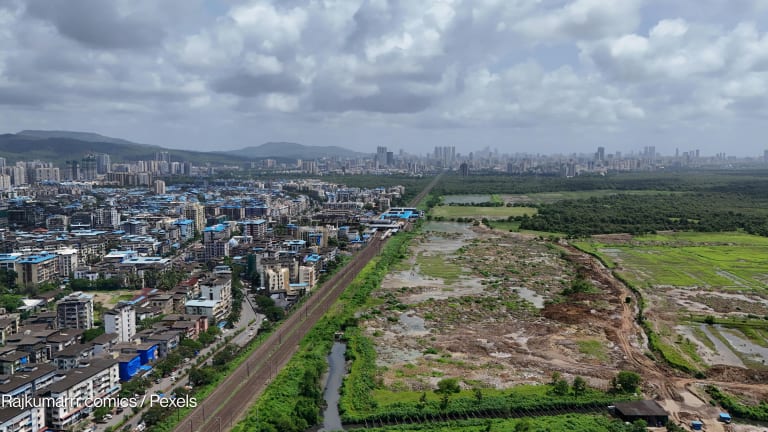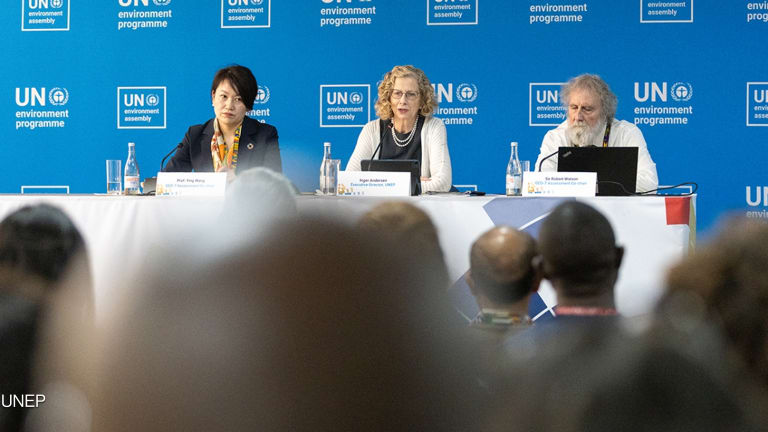Multiple intersecting and compounding crises have made forthcoming climate negotiations the most challenging in recent history, according to Patricia Espinosa, who in mid-July ended her six-year tenure as executive secretary of the United Nations Framework Convention on Climate Change.
“This is definitely one of the most difficult scenarios that we have seen for decades. It's probably the most complex scenario that we have seen in decades,” Espinosa said during a Devex Newsmaker event. “It’s really terrible.”
While the 26th United Nations Climate Change Conference, or COP 26, took place in fall 2021 as the COVID-19 pandemic raged, the geopolitical picture has taken a dramatic turn since then. Russia’s invasion of Ukraine has gravely strained international relationships and triggered a food, energy, and financial crisis — worsening the effects of other conflicts around the world. Meanwhile, the number of extreme weather events is rising, and experts fear cascading emergencies are putting significant pressure on the international system.
“[COP 27] will be taking place in this very unfortunate situation. However, I think that we should use the conference as an opportunity to say: ‘Look, regardless of all of those crises, the climate change emergency remains the biggest threat to humanity. And in that regard, we cannot have the luxury of postponing any kind of action,’” said Espinosa, who prior to joining the U.N. served as Mexico’s secretary of foreign affairs and as the country’s ambassador to Germany.
“We need to have everybody on board, because climate change does not recognize any borders,” she added.
According to Espinosa, this includes Russia. Mistrust between Russia and the West is high because of the invasion and its international fallout, such as the disruption of grain exports from Ukraine, a major agricultural producer.
Beasley celebrates Ukraine grain deal; shipments to start within weeks
United Nations officials are welcoming a new deal to get Ukrainian grain out of the country amid the escalating threat of famines globally.
“We don't have any legal mechanism that would allow us to say, ‘Look, we are going to exclude this or that country,’” she said. “And regarding climate change, the nature of this existential threat to humanity, I think, is the key to understanding that it is not possible to pretend that we are going to address effectively the climate crisis if we do not allow everybody to participate.”
There are “so many different views in the international community” around economic policies, political practices, and human rights, Espinosa said, “but I really believe this [climate crisis] is an area where we just need to work together.”
She said that the world may have already crossed “tipping points” — a concept used by climate experts to describe the theoretical process of global warming triggering a cascading series of harmful environmental events.
“We have already reached these tipping points in many areas,” she said. “If we look at the losses [of] species that have been eliminated from the face of the Earth, and that we will not be able to see again, that's a very clear indication of this.”
With Europe, and the U.K. in particular, experiencing record summer temperatures and wildfires, Espinosa said she hoped politicians would view the severe weather and its effects as “an opportunity to assume a very important responsibility in taking decisions that will affect the way humanity will be living in the future.”
As these extreme events continue, she said it is also important to acknowledge the trauma of people severely affected by climate change and suggested that this is an area the U.N. could work on at some point.
“Not all of these issues are addressed … [including] the question of the psychological consequences of climate change,” said Espinosa. “I refer to the trauma that people experience when they lose everything. They have to flee from their houses. … They are evacuated because the fire is catching their house. … Just imagining that situation is so scary.”
She also expressed concerns about the anxiety of younger generations, saying they are “very much afraid about their future and what is happening and feel very confused on how to react and what to do.”
The World Health Organization — rather than UNFCCC — might be a platform for this work, as “they are now putting emphasis on climate change and health,” said Espinosa.
Being a negotiator taught her that “it is very easy to lose sight of the overall picture,” as discussions tend to deal with one specific issue. “So it is very important that we can keep a high-level conversation that integrates all the different issues and that gives them a clear perspective of why each one of those individual pieces are so important,” she said.
The involvement of political leaders in negotiations — whose guidance is “frequently not there” — is an important way of achieving this, she said. Espinosa said she believes the outcome of COP 26 was improved by the presence of political leaders. “It was, in my view, the first time that we saw from so many leaders a very clear recognition that they had failed [to deliver on climate finance],” she said.
Amid such gloom, where does Espinosa see cause for optimism? It’s a sparse field. She cited the recent addition of the Vatican to the Paris climate accord as a “very important signal.”
“I interpreted it as a signal that the Paris agreement and the [U.N. climate] convention — that whole process of intergovernmental process on climate change — has this credibility. It is a strong piece of the international multilateral system,” she said.
Espinosa also cited climate “innovation” within the private and financial sectors. “Yes, we need to do more work in terms of being able to follow up and have some more insights on the pledges that [the] private sector is making. But the fact that it is happening, to me, indicates there is a clear recognition that this is the way to go.”
UNFCCC now has an acting executive secretary, Ibrahim Thiaw, but a permanent U.N. climate chief has not yet been appointed. Espinosa’s blunt advice for her successor is: “Don’t ever give up.”








